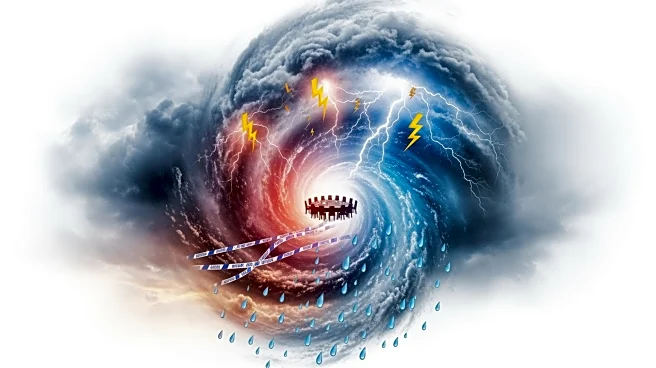What's Happening?
Tropical Storm Melissa has formed in the central Caribbean and is expected to intensify into a hurricane by the weekend. Currently, a Hurricane Watch is in effect for the south coast of Haiti, and a Tropical Storm Watch is in place for Jamaica. As of Tuesday
afternoon, Melissa was located approximately 305 miles south of Port-au-Prince, Haiti, with sustained winds of 50 mph. The storm is moving westward at 14 mph and is predicted to bring heavy rainfall and strong winds to the region. The National Hurricane Center forecasts that Melissa could cause significant flooding and mudslides, particularly in Haiti and the southern Dominican Republic, due to the near-record warm Caribbean waters fueling its growth.
Why It's Important?
The development of Tropical Storm Melissa is significant due to its potential to cause severe weather conditions in the Caribbean, a region already vulnerable to natural disasters. The storm's progression into a hurricane could lead to catastrophic flooding and landslides, especially in Haiti, where deforestation and political instability exacerbate the impact of such events. The economic and humanitarian implications are considerable, as past storms have resulted in substantial loss of life and property damage. The situation underscores the ongoing challenges posed by climate change, which has increased the likelihood of such intense weather phenomena.
What's Next?
Forecast models suggest varying paths for Melissa, with some predicting a slow westward movement, while others anticipate a northward turn. The uncertainty in the storm's trajectory means that residents and authorities in the Caribbean must remain vigilant and prepared for potential evacuations and emergency responses. The National Hurricane Center will continue to monitor the storm's development, providing updates and warnings as necessary. The potential for Melissa to strengthen further highlights the need for robust disaster preparedness and response strategies in the affected regions.
Beyond the Headlines
The formation of Tropical Storm Melissa highlights the broader implications of climate change on weather patterns, particularly in the Caribbean. The unusually warm sea surface temperatures, attributed to human-induced climate change, have increased the likelihood of such storms. This situation calls for a reevaluation of environmental policies and disaster management strategies to mitigate the impact of future storms. Additionally, the storm's potential impact on vulnerable communities raises ethical considerations regarding global responsibility and support for climate adaptation and resilience efforts.















